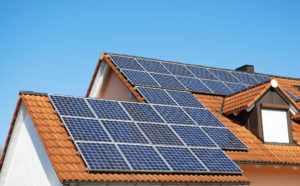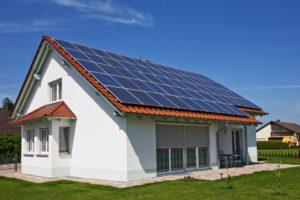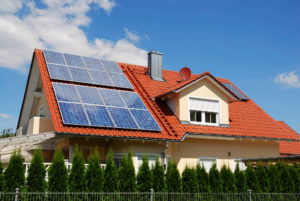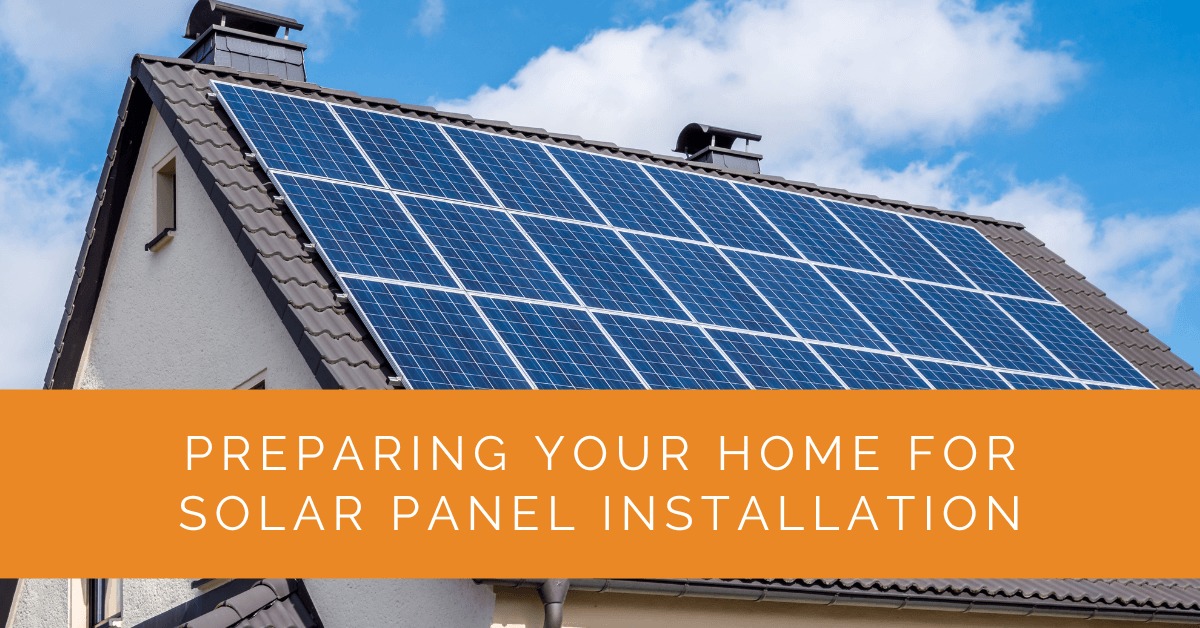As the world shifts towards cleaner and more sustainable energy sources, solar power has emerged as a popular choice for homeowners looking to reduce their carbon footprint and save on energy costs. Installing solar panels on your property can be transformative, providing you with a renewable and eco-friendly energy source. However, before you take the plunge into solar power, it’s essential to ensure that your home is adequately prepared for the installation process. In this article, we’ll guide you through the steps to prepare your home for solar panel installation, maximizing its efficiency and ensuring a successful transition to solar energy.
Contents
- 1 Key Takeaways
- 2 Assessing Your Home’s Suitability for Solar Panels
- 3 Roof Preparation and Maintenance
- 4 Evaluating Your Electrical System
- 5 Solar Readiness Estimator
- 6 Maximizing Energy Efficiency
- 7 Understanding Local Regulations and Permits
- 8 Choosing the Right Solar Panel System
- 9 Hiring a Professional Solar Installer
- 10 Preparing for the Installation Day
- 11 Case Study: Preparing a Residential Property for Solar Panel Installation
- 12 Expert Insights From Our Solar Panel Installers About Preparing Your Home for Solar Panel Installation
- 13 Experience Solar Excellence with Us!
- 14 Conclusion
Key Takeaways
- Assess your home’s suitability for solar panels by evaluating your roof’s condition and orientation, consulting with a professional installer, and determining your energy needs.
- Prepare your roof for solar panel installation through thorough inspection, repairs, and clearing of obstructions to ensure long-term stability and efficiency.
- Maximize energy efficiency by conducting an energy audit, implementing energy-saving measures, and reducing energy consumption before going solar.
Assessing Your Home’s Suitability for Solar Panels
The first step in preparing your home for solar panel installation is determining whether your property is suitable for solar energy. Solar panels work best when installed on roofs with optimal orientation and minimal obstructions. Here’s what you should consider:
Evaluating Your Roof’s Condition and Orientation
Inspect your roof to assess its structural integrity. Solar panels typically have a 25 to 30 years lifespan, so it’s crucial to ensure that your roof can support them for the long term. If your roof is older or needs repairs, it’s best to address these issues before installing solar panels. Additionally, consider the orientation of your roof. South-facing roofs receive the most sunlight throughout the day and are ideal for solar panel placement.
Determining Your Home’s Solar Potential and Energy Needs
Engage with a professional solar installer to conduct a solar potential analysis for your home. They will assess your property’s sun exposure, shading issues, and energy needs to design the optimal solar system for your home. By understanding your energy consumption patterns, you can choose the right-sized solar panel system to meet your electricity demands effectively.
Consulting with a Professional Solar Installer
Collaborating with an experienced solar installer is critical during this stage. Their expertise will help you decide about solar panel placement, system size, and energy output estimations. Working with professionals ensures a smooth installation process and maximizes the benefits of solar energy for your home.
Roof Preparation and Maintenance
Your roof is the foundation of your solar panel installation, and ensuring its stability is crucial. Here are the essential steps to prepare your roof for solar panels:
Roof Inspection and Repairs
Hire a roofing professional to conduct a thorough inspection of your roof. They will identify and address any existing issues before the solar panel installation. Repairing leaks, replacing damaged shingles, and reinforcing weak areas will ensure your roof remains in top condition throughout the solar panel’s lifespan.
Reinforcing the Roof for Solar Panel Installation
Solar panels add some weight to your roof, and it’s vital to reinforce it accordingly. Your solar installer will work with the roofing expert to strengthen the areas where the panels will be mounted. This step ensures that your roof can withstand the added weight and the elements for years.
Clearing Debris and Obstructions
Trim any overhanging branches or nearby trees that may cast shadows on your solar panels. Shade can significantly reduce the efficiency of your solar system, so it’s essential to minimize potential obstructions. Additionally, keep your roof clear of debris to prevent any issues during the installation process.

Evaluating Your Electrical System
Preparing your home for solar panel installation involves more than just the physical structure. Your electrical system must also be ready to integrate seamlessly with your solar setup. Consider the following steps:
Upgrading Your Electrical Panel and Wiring
Before installing solar panels, have a licensed electrician inspect your electrical panel to ensure it can handle the additional load from the solar system. Upgrading to a modern and robust electrical panel will prevent potential issues and allow a smooth transition to solar power.
Installing a Solar-Friendly Inverter
The inverter is a crucial component of your solar panel system, as it converts the DC electricity produced by the panels into usable AC electricity for your home. Make sure to install an inverter that is compatible with your solar panel system’s size and type. Discuss the best inverter options to maximize energy conversion efficiency with your solar installer.
Ensuring Grid Compatibility and Net Metering
If you plan to remain connected to the grid, check with your utility company about their net metering policies. Net metering allows you to sell excess solar energy back to the grid, earning credits that can offset your electricity bill during periods of low solar production. Ensure that your solar panel system complies with your local utility’s requirements for grid connectivity.
Solar Readiness Estimator
Check if your home is ready for solar panel installation.
This tool provides a general assessment. Always consult a certified solar installer before planning your system.
Maximizing Energy Efficiency
Before installing solar panels, reducing your home’s energy consumption is essential. Maximizing energy efficiency can further decrease your reliance on the grid and make the most of your solar power investment. Consider the following steps:
Conducting an Energy Audit
An energy audit helps identify areas of high energy consumption in your home. You can perform a DIY audit or hire a professional energy auditor. Addressing insulation issues, sealing air leaks, and upgrading to energy-efficient appliances can significantly reduce energy consumption.
Implementing Energy-Efficient Measures
Invest in energy-saving technologies such as LED lighting, smart thermostats, and energy-efficient windows and doors. These upgrades reduce your energy bills and make your home more appealing to potential buyers in the future.
Reducing Energy Consumption Before Going Solar
By adopting energy-conscious habits, such as turning off lights and electronics when not in use, you can lower your energy consumption even further. These simple practices complement your solar panel system, allowing you to generate more of your energy needs through renewable sources.

Understanding Local Regulations and Permits
Solar panel installations are subject to various local regulations and permitting requirements. Ensuring compliance with these rules is essential to avoid legal issues or delays. Here’s what you should do:
Researching Local Solar Panel Installation Regulations
Check with your city or county government to understand the specific regulations governing solar panel installations in your area. Some areas might have restrictions on panel placement or require specific design elements.
Obtaining Necessary Permits and Approvals
Apply for all the required permits before the installation begins. Your solar installer can help you navigate the permitting process, ensuring all necessary paperwork is in order.
Understanding Tax Credits and Incentives for Renewable Energy
Explore available tax credits, rebates, and incentives for installing a solar panel system in your area. These financial incentives can significantly reduce the overall cost of your solar installation, making renewable energy more accessible and affordable for homeowners.
Choosing the Right Solar Panel System
Selecting your home’s best solar panel system is crucial to maximizing its efficiency and long-term benefits. Consider the following factors when making your decision:
Selecting the Appropriate Solar Panel Size and Type
Work with your solar installer to determine the right-sized solar panel system for your energy needs. They will consider your energy consumption, roof space, and budget to recommend the best-fit solution.
Considering Battery Storage Options
Solar batteries allow you to store excess energy generated during sunny periods for use during cloudy days or at night. This option enhances your energy independence and provides backup power in case of grid outages.
Exploring Residential Solar Energy Systems
Various types of solar panel systems are available, including grid-tied, off-grid, and hybrid systems. Each has advantages and limitations, so take the time to understand which type suits your requirements and preferences.

Hiring a Professional Solar Installer
To ensure a successful solar panel installation, working with an experienced and reputable solar installer is essential. Here’s what you should consider during the selection process:
Researching Reputable Solar Installation Companies
Look for solar installers with a proven track record and positive customer reviews. Seek recommendations from friends or neighbors who have already installed solar panels on their properties.
Obtaining Multiple Quotes and Comparing Services
Request quotes from multiple solar installation companies to compare pricing, equipment options, and warranties. Don’t base your decision solely on price; consider the overall value and expertise each company offers.
Verifying Credentials and Certifications
Check that the solar installer is licensed, insured, and certified to install solar panels. Hiring a professional with the right credentials ensures the installation is done safely and up to industry standards.
Preparing for the Installation Day
The big day is approaching, and there are a few things you can do to prepare for the installation process:
Clearing the Installation Area
Ensure that the area around your home is clear of any obstacles hindering installation. Move any outdoor furniture or objects that could get in the way of the installers.
Making Necessary Arrangements with the Installer
Coordinate with the solar installation team regarding the installation day and time. Be prepared for some disruptions during the installation, and plan accordingly to accommodate the process.
Ensuring Safety Precautions are Followed
On the day of the installation, prioritize safety. Keep children and pets from the work area to avoid accidents or disturbances. Follow the instructions of the installation team to ensure a smooth and safe process.
Case Study: Preparing a Residential Property for Solar Panel Installation
Background
At Solar Panels Network USA, we pride ourselves on providing comprehensive solar solutions tailored to each client’s unique needs. One of our recent projects involved a homeowner eager to transition to solar energy but needed guidance on preparing their property for the installation. This case study highlights the steps we took to ensure their home was ready for solar panels, maximizing efficiency and ensuring a successful transition.
Project Overview
The homeowner wanted to reduce their carbon footprint and save on energy costs by installing solar panels. They sought our expertise to assess their property’s suitability, prepare their roof, evaluate their electrical system, and implement energy efficiency measures. Our goal was to provide a seamless transition to solar power while ensuring long-term stability and maximum energy production.
Implementation
Initial Assessment
We began with a comprehensive assessment of the homeowner’s property. This involved evaluating the roof’s condition, orientation, and potential shading issues. We also conducted an energy audit to identify areas for efficiency improvements.
Roof Inspection and Repairs
A thorough inspection revealed minor roof repairs were needed before installing the solar panels. We coordinated with a roofing professional to address these issues, ensuring the roof could support the panels for their expected lifespan of 25 to 30 years. Additionally, we reinforced the roof to accommodate the added weight of the solar panels.
Electrical System Evaluation
Next, we evaluated the home’s electrical system to ensure it could handle the new solar panel installation. This involved upgrading the electrical panel and installing a solar-friendly inverter to optimize energy conversion. We also ensured the system was compatible with the local grid and net metering policies.
Energy Efficiency Enhancements
Energy Audit and Upgrades
The energy audit revealed several areas for improvement, including insulation, air sealing, and upgrading to energy-efficient appliances. We worked with the homeowner to implement these changes, reducing their overall energy consumption and making the solar system more effective.
Implementing Energy-Saving Measures
To further enhance energy efficiency, we recommended the installation of LED lighting, smart thermostats, and energy-efficient windows and doors. These upgrades not only reduced energy bills but also increased the home’s overall comfort and value.
Compliance and Permits
Navigating Local Regulations
Understanding local regulations and obtaining the necessary permits were critical to the project. We researched the specific requirements for solar panel installations in the homeowner’s area and ensured all permits and approvals were in place before beginning the installation.
Securing Incentives and Rebates
We also helped the homeowner explore available tax credits, rebates, and incentives for installing a solar panel system. These financial incentives significantly reduced the overall cost of the installation, making it a more affordable investment.
Results
Successful Installation
The homeowner’s property was thoroughly prepared, and the solar panel installation proceeded smoothly. The system was installed with optimal placement, ensuring maximum sun exposure and energy production.
Enhanced Energy Efficiency
The energy efficiency measures implemented prior to the solar installation resulted in reduced energy consumption. This allowed the solar system to cover a larger portion of the homeowner’s energy needs, further lowering their electricity bills.
Long-Term Benefits
By following our comprehensive preparation process, the homeowner ensured the long-term stability and efficiency of their solar panel system. They now enjoy the benefits of clean, renewable energy and the satisfaction of contributing to a more sustainable future.
Summary
This case study demonstrates the importance of thorough preparation when transitioning to solar energy. At Solar Panels Network USA, we guide homeowners through every step of the process, from initial assessment to installation and beyond. Our comprehensive approach ensures that properties are well-prepared for solar panel installations, maximizing efficiency and long-term benefits. By addressing roof repairs, enhancing energy efficiency, and navigating local regulations, we help our clients achieve a seamless and successful transition to solar power.
Expert Insights From Our Solar Panel Installers About Preparing Your Home for Solar Panel Installation
Proper preparation of your roof is crucial before installing solar panels. Addressing any repairs or structural issues beforehand ensures the long-term stability and efficiency of your solar system.
Senior Solar Installer
An energy audit can reveal areas where you can improve efficiency. Implementing these changes before going solar maximizes your system’s effectiveness and reduces your overall energy consumption.
Lead Solar Technician
Engaging with a professional solar installer early in the process is key. Their expertise in assessing your home’s solar potential and handling permits ensures a smooth installation and optimal performance.
Solar Installation Expert
Experience Solar Excellence with Us!
Trust in Solar Panels Network USA, where our seasoned experts deliver top-quality solar solutions for homes and businesses nationwide. With a legacy of countless successful installations and a commitment to sustainable energy, we’re your reliable partner in the solar journey. Ready for a brighter, eco-friendly future? Call us now at (855) 427-0058 and harness the power of the sun!
Conclusion
Embracing solar energy by installing solar panels in your home is a wise and environmentally responsible decision. However, proper preparation is essential for a successful solar panel installation and long-term energy savings. You can make the most of your solar power investment by assessing your home’s suitability for solar panels, preparing your roof, evaluating your electrical system, maximizing energy efficiency, understanding local regulations, and hiring a reputable solar installer.
Remember, each home is unique, and working with a professional solar installer ensures you receive personalized advice tailored to your needs. Once your home is ready for solar panel installation, you can enjoy the benefits of clean and renewable energy, lower energy bills, and the satisfaction of contributing to a more sustainable future for our planet. So, get ready for solar and embrace the power of the sun!
About the Author
Solar Panels Network USA stands at the forefront of solar energy solutions, driven by a team of seasoned solar engineers and energy consultants. With over decades of experience in delivering high-quality solar installations and maintenance, we are committed to promoting sustainable energy through customer-centric, tailored solutions. Our articles reflect this commitment, crafted collaboratively by experts to provide accurate, up-to-date insights into solar technology, ensuring our readers are well-informed and empowered in their solar energy decisions.

